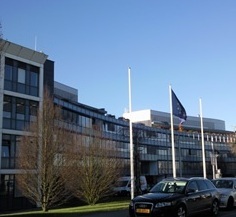 The Fourth Meeting of the Forum of Euro-Mediterranean Statisticians, organized by the Eurostat, was held on 19-20 May 2015 in Luxembourg with the participation of 32 representatives from National Statistics Offices (NSOs) of the Mediterranean Region including Egypt, Jordan, Lebanon, Libya, Morocco, Palestine, and Tunisia as OIC Member Countries, the NSOs of European Union and other European Neighbourhood Policy (ENP)-South Countries, and international organizations including European Free Trade Association (EFTA) and SESRIC. Dr. Atilla Karaman, Senior Researcher at the Statistics and Information Department, represented the Centre thereat
The Fourth Meeting of the Forum of Euro-Mediterranean Statisticians, organized by the Eurostat, was held on 19-20 May 2015 in Luxembourg with the participation of 32 representatives from National Statistics Offices (NSOs) of the Mediterranean Region including Egypt, Jordan, Lebanon, Libya, Morocco, Palestine, and Tunisia as OIC Member Countries, the NSOs of European Union and other European Neighbourhood Policy (ENP)-South Countries, and international organizations including European Free Trade Association (EFTA) and SESRIC. Dr. Atilla Karaman, Senior Researcher at the Statistics and Information Department, represented the Centre thereat
The Euro-Mediterranean statistical cooperation was launched by the Barcelona declaration and the Euro-Mediterranean partnership (1995/1996) which intended ‘to promote cooperation in statistics in order to harmonise methods and exchange data’. The Valencia seminar, which took place in December 1995, was the starting point of the regional programme for statistical cooperation. A number of missions in the Mediterranean countries helped to establish a list of priority fields to be covered, and these were approved during the Naples Seminar in June 1996. The main objective of Euro-Mediterranean cooperation in statistics is to set up a continuing process of statistical harmonization to allow gradual convergence towards harmonised and comparable economic and social data in ENP-South countries and to increase compliance with European and international standards. Ever since then, three consecutive MEDSTAT programmes have been implemented (I, II and III). The latest of the three, MEDSTAT III built on the achievements of MEDSTAT I and II and aimed to consolidate and further strengthen the statistical cooperation drawing on past results. As MEDSTAT III would end in 2013, the Directors Committee meeting that took place in May 2012 in Athens, Greece approved the setting up of a Forum of Euro-Mediterranean Statisticians, a high-level decision-making body whose role is to steer the cooperation and to discuss and validate joint work programmes.
The first day of the meeting – that was also open to the attendance of international organisations – started with the welcoming remarks of Ms. Claudia Junker, Head, Unit A3 "Statistical Cooperation" of Eurostat, and Ms. Maral Tutelian Guidanian, Director General of the Central Administration of Statistics of Lebanon and Co-Chair of the Forum for 2013 and 2014. After the adoption of the agenda by the participating ENP-South Countries, the participants listened to the presentations on the recent developments in the European Statistical System (ESS) and the overview on the Directorate General Neighbourhood and Enlargement Negotiations. Following these presentations and with the proposals of Libya, Egypt, and Morocco, the Forum re-elected Lebanon as the Co-Chair for 2015 and 2016.
Session 3 considered the presentations on the Code of Practice and Quality. The Statistics Code of Practice (CoP) for the ENP-South Countries (based on the European Statistics CoP) was first proposed as a regional CoP in March 2014 in Rome. The Forum adopted the CoP as a benchmark for the ENP-South Countries. The CoP in total includes 16 principles and 84 good practice indicators that covers the institutional environment, the statistical processes and the statistical outputs. The participants then were briefed about the activities of the Quality Working Group including the planned activities for 2013-2015, activities carried out, and future planned activities among which the development of a regional Quality Assurance Framework (QAF) and self-assessment questionnaire based on the ENP-South CoP withdrew attention. Concerning the identification of the possible themes for the upcoming Quality Seminar in November 2015, the participants stressed the focus should be given to the QAF and self-assessment questionnaire which is in parallel to the interest shown for the preceding presentation. Session 3 ended with the presentation on the available tools for the implementation of the CoP and Q&A from the participants with the presenters.
Session 4 covered the presentations of the ENP-South Countries about the two twinning projects and two sectoral reviews on labour force statistics. The presenters found the opportunity to communicate their feedback on their country specific experiences on the activities undertaken. Session 4 ended with the presentation on the Value Added of Adapted Global Assessment (AGA) in Tunisia. The participants requested from the Eurostat to supply the Arabic translation of the Executive Summary of the AGA carried out in Tunisia to better understand the activities undertaken and recommendations provided.
The first day of the meeting was finalised with Session 5 on the definition of the National Statistical System and Official Statistics. The participants exchanged views based on the previously provided questions by the Eurostat.
The meeting went on with the themes on 20 May 2015 as a closed session for the ENP-South countries only.
For more information, please visit: http://ec.europa.eu/eurostat/web/european-neighbourhood-policy/enp-south